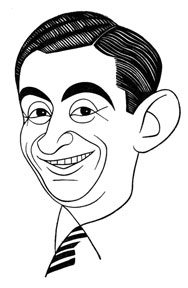In this chapter from his 1932 book, Times Square Tintypes, Broadway columnist Sidney Skolsky profiles perhaps the greatest of American songwriters, Irving Berlin.
THE BIRTH OF THE BLUES
HE has a name that will live forever and he bought it for a song. IRIVING BERLIN.
 Came to this country at the age of four, the youngest of eight children. In Russia his father was a cantor. Here a kosher butcher.
Came to this country at the age of four, the youngest of eight children. In Russia his father was a cantor. Here a kosher butcher.He has yet to find a hat to fit him.
He eats a lot for one of his size.
Plays the piano by ear. And only in F sharp. Has a specially constructed piano with a sliding keyboard. When the music calls for another key he merely moves the lever.
He is not a one finger player. Uses all his fingers badly.
Has a scar on his forehead. It was received on a Washington’s Birthday in Cherry Street, trying to start a bonfire.
Thinks he is a good stud poker player. His friends say he’s lucky.
His pet aversions are riveters and second verses.
Ran away from home at the age of fourteen. His first stop was Callahan’s saloon. Here he sang “The Mansion of Aching Hearts” until enough coins were tossed at him to pay for a night’s lodging. Later became a singing waiter at Nigger Mike’s place, 12 Pell Street. The barker on the trip to Chinatown bus now points out the place.
He wrote “Alexander’s Ragtime Band,” credited with starting the jazz vogue, at the age of twenty-three.
Crowds frighten him. So do certain individuals.
His idea of a great achievement is writing a song that reaches the million copy mark.
Maintains a home in West Forty-sixth Street. But lives elsewhere. The first of every month generally finds him moving.
His square moniker is Israel Baline. For a time, he went under the name of Cooney. Became Berlin because that was the way the Bowery pronounced Baline.
As a singing waiter he kicked a hoofer named George White out of the place for being a pest, and he served Al Smith.
Is always chewing gum. This can be observed by merely watching the funny way his hat moves on his head.
His favorite biographer is Alexander Woollcott.
He composes in this fashion: First playing the song on the piano. Then singing it to Arthur Johnson, his right and left hand man, who records upon paper what he hears. Then Johnson plays the written manuscript. This is the first draft. From this Berlin works on to the final version. Often after a song has been published he changes it.
His bill for flowers for the Mrs. is $1,000 a month.
His patent leather dinner shoes have more cracks than his hair has waves.
Of all the songs he has written, a figure exceeding four hundred, his favorite is “The Song Is Ended But the Melody Lingers On.”
Is very restless. Can’t sit or stand still. Always paces the floor. He walks miles in any room he is in. It is the only exercise he gets.
As far as playwrights go, his taste begins and ends with George S. Kaufman. As for music, he’ll whistle anything by Jerome Kern. For lyrics he hands first prize to B. G. De Sylva. And if asked to name the swellest guy in the theatrical game, he’d shout Sam Harris.
He has had to change his entire working schedule since he became a father.
He has never worn a diamond. The only jewelry he wears is, occasionally, a pearl tie pin.
Never eats the crust of bread or rolls. Always plucks the filling. This can be seen circled about his plate.
After finishing a song he sings it to the first person he meets. A bell boy at Palm Beach was the first person to hear “Lazy.” A Broadway taxi driver was the first to hear “All Alone.” A bewildered stranger, occupation unknown, was the first to hear “Say It With Music.”
He never writes anything in longhand but his signature on a check. Everything else he prints.
The one thing in life he is looking forward to is walking into a restaurant with his daughter, Mary Ellen.
Of all the songs ever written the one he’d love to be the author of is “The Rosary.”
On the fly leaf of a book containing every song he wrote there is this ditty which he believes sums up everything:
Let Me Be a Troubadour,And I Will For Nothing MoreThan One Short Hour Or SoTo Sing My Song And Go.
He has a form-fitting couch which was especially designed for him.
